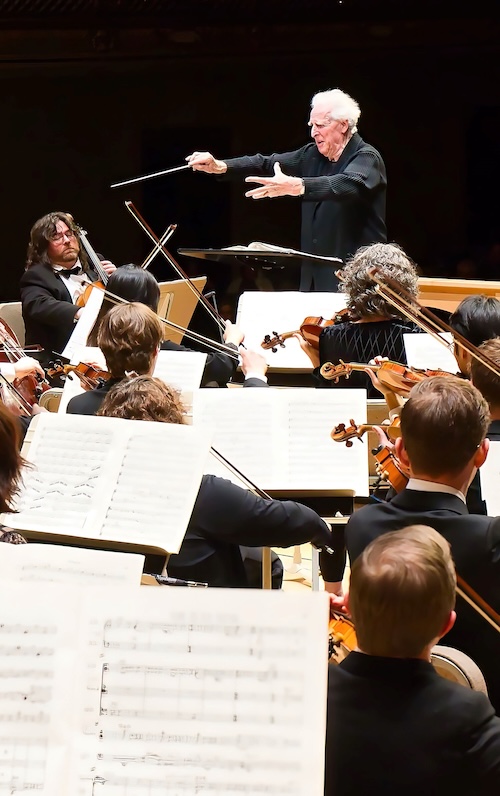Zander, Boston Philharmonic deliver the grandeur and intimacy of “The Planets”

Benjamin Zander led the Boston Philharmonic Orchestra in Gustav Holst’s The Planets Sunday in Symphony Hall. Photo: Hilary Scott
“Progress depends above all on the temper of the nation,” Anthony Eden told the House of Commons in 1938. “And that temper must find expression in a firm spirit.”
The former foreign secretary and future prime minister was, of course, speaking to far weightier matters than a concert. But the notion of exploring a distinctive national voice was one of several things that permeated the Boston Philharmonic Orchestra’s performance Sunday afternoon at Symphony Hall (which was heard remotely, via the BPO’s livestream). Led by Benjamin Zander, the focus was, fittingly enough, England by way of three pieces with special ties to the conductor.
The program’s oldest item was, paradoxically, also its most recent: Benjamin Britten’s 1963 revision of his 1948 arrangement of Henry Purcell’s Chacony in G minor (which, itself, dates from around 1680). Zander, who as a youth was mentored by Britten, led a spacious account of this beautiful opus that fused melancholic majesty with the graceful sensibility of an ephemeral dance.
Similar, though often more robust, qualities marked the afternoon’s assayal of Gustav Holst’s The Planets.
Written during the first years of World War 1, this portrait of what the composer described as “the astrological significance of the planets” has long stood as one of the 20th-century’s biggest orchestral hits. Based on Sunday’s rendition, there is no question as to why: it is thrilling music—blazingly colorful and, despite its familiarity, full of resoundingly fresh turns of phrase, harmony, and instrumentation.
Zander knows The Planets’ ins and outs well. Having studied with Holst’s daughter, Imogen, and conducted it frequently over the years, that is to be expected. Yet the mix of poignancy and vitality that defined this weekend’s performance was special.
Throughout, he and the Philharmonic brilliantly illuminated the score’s architecture. The shattering climaxes of “Mars” roared, though at all times the section was carefully paced and smartly driven. So was “Jupiter,” whose glorious medial hymn was full-blooded yet, at the same time, touchingly lyrical and vulnerable.
The reflective movements delivered strong contrasts and, when applicable, delicate beauty. Solos in “Venus”—particularly those from principal horn Kevin Owen, principal oboe Peggy Pearson, and concertmaster Gregory Vitale—were spot-on. The regal processional in “Saturn” was at once mysterious and unostentatiously defiant, its syncopated apex gleaming like a torch.
Meantime, “Mercury” flitted lightly, with a trio that didn’t once hold back on sweeping, cinematic flair. Neither did the puckish “Uranus,” whose humorously menacing outbursts on Sunday sounded like an idiosyncratic Dickensian village out on parade.
At the opposite end of the expressive spectrum sat the concluding “Neptune.” Here, ethereal harp and celesta arpeggios blended beguilingly into the haunting off-stage voices of the Radcliffe Choral Society singing from the second balcony.
Before the Holst came Edward Elgar’s Cello Concerto.
Anyone who has followed the BPO long enough will know that Zander is a cellist by training and a certain bias for that instrument is one of the hallmarks of his concert programming. On Sunday, the solo spotlight belonged to Alexander Baillie, a friend of the ensemble’s for more than thirty years.
Though the afternoon’s account largely captured the music’s contrasts of character and mood, it was also occasionally scrappy. Nevertheless, the Allegro molto zipped pleasingly while the Adagio sang with warm passion. Afterwards, the cellist gifted the house an encore of the “Sarabande” from Bach’s Cello Suite No. 3.
For their part, Zander and the BPO provided a resolute accompaniment distinguished by moments of affecting grace. The first movement’s turns to the major were touchingly wistful – like the sun briefly breaking through clouds – while the short orchestral zenith in the finale’s last slow episode rang with becoming radiance.
The Boston Philharmonic Orchestra performs music by Richard Strauss and Mahler at 3 p.m. February 16, 2025 at Symphony Hall. bostonphil.org
Posted in Performances

